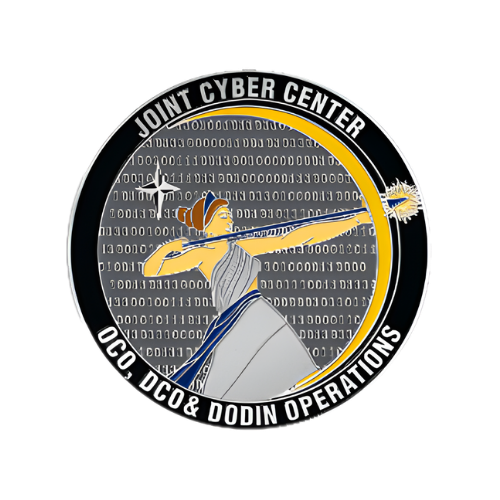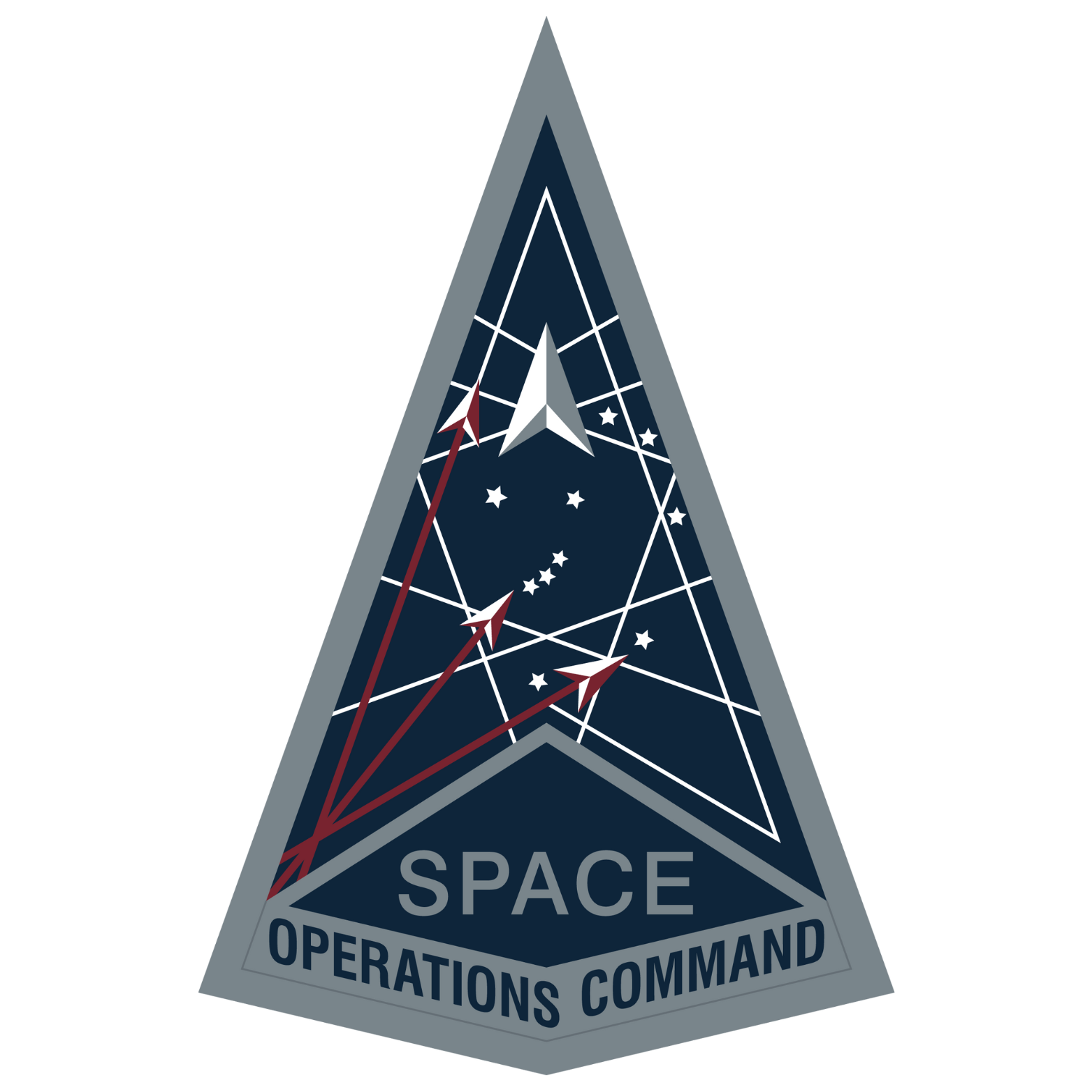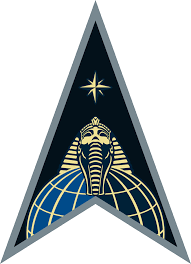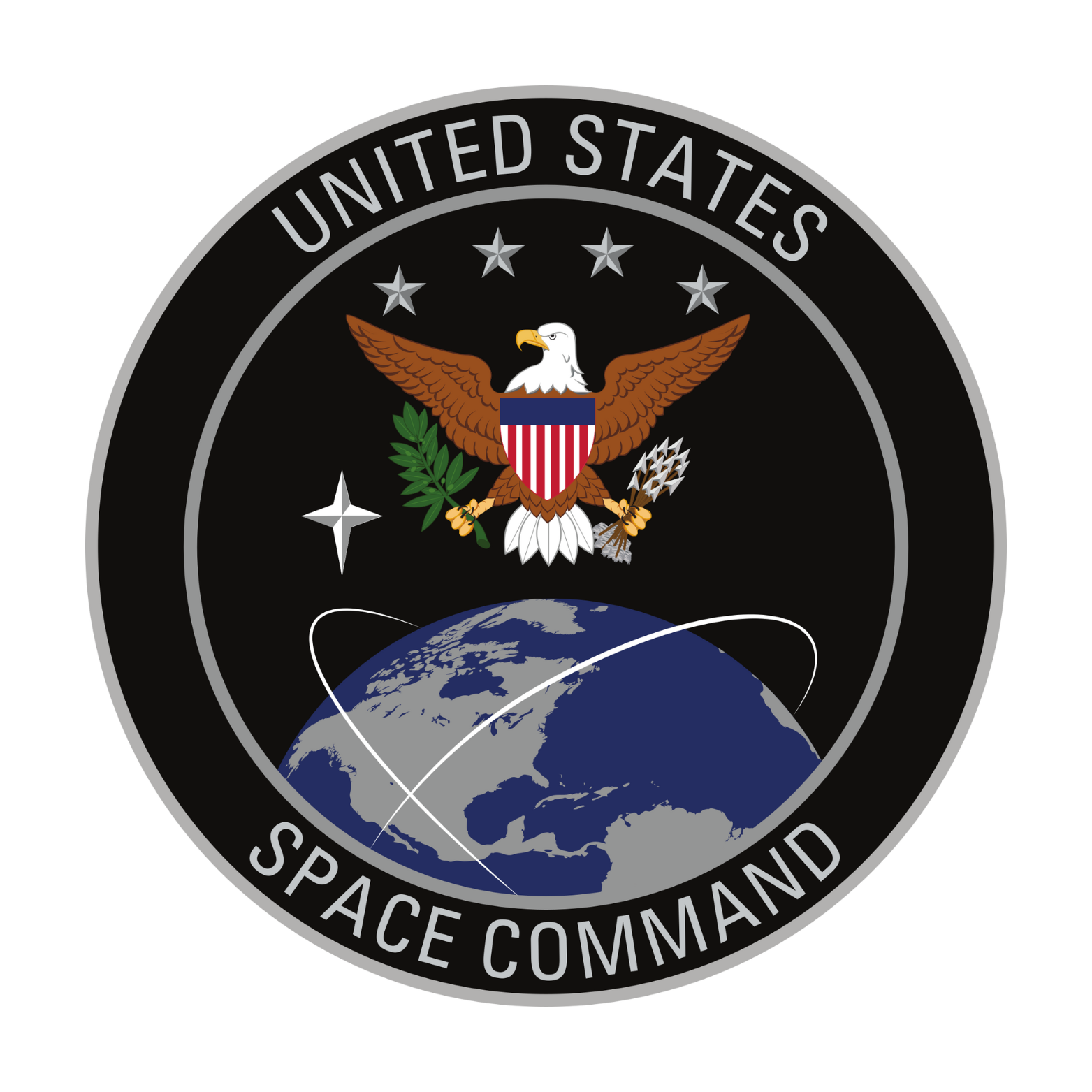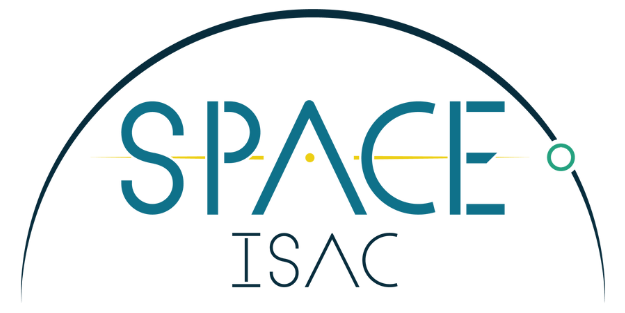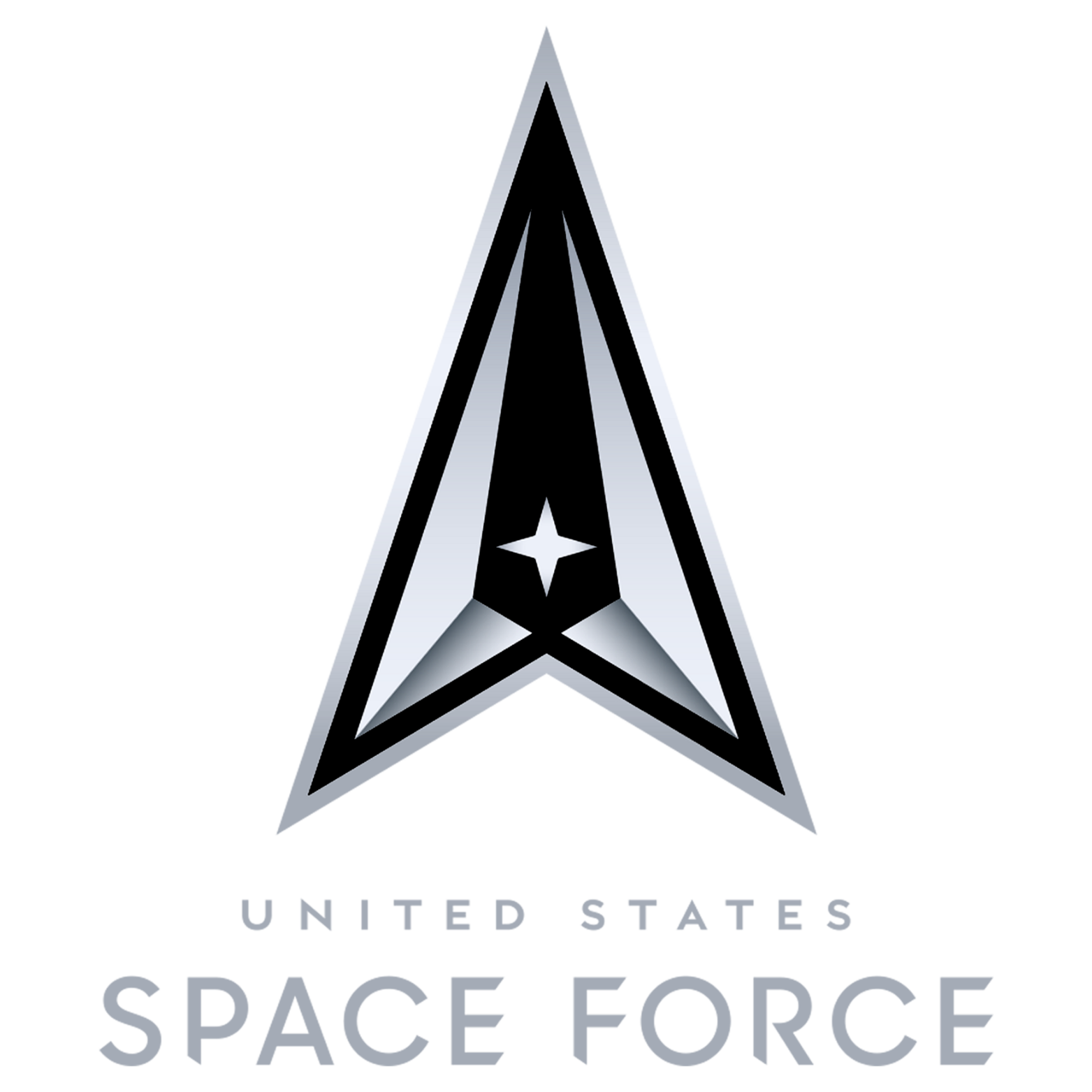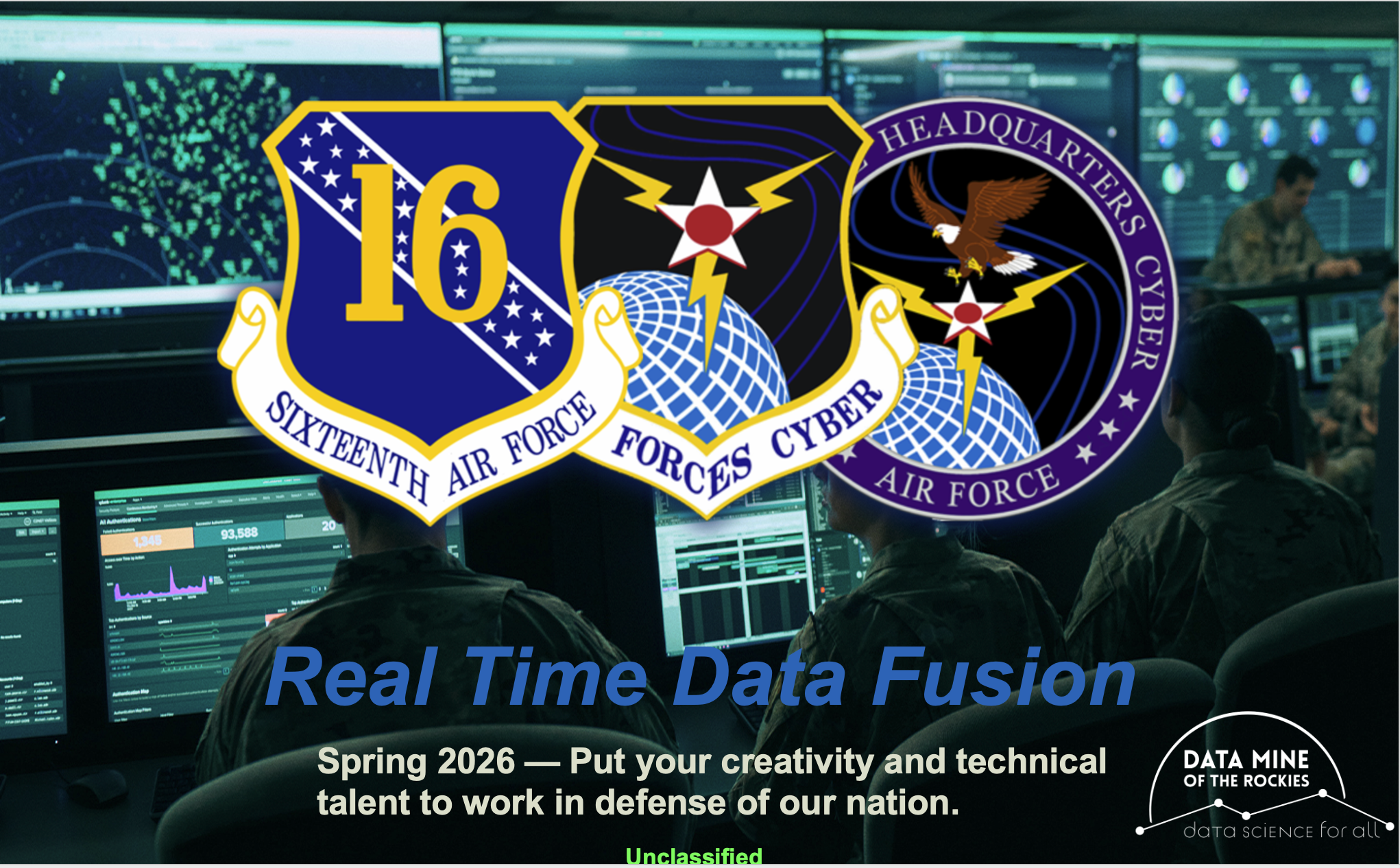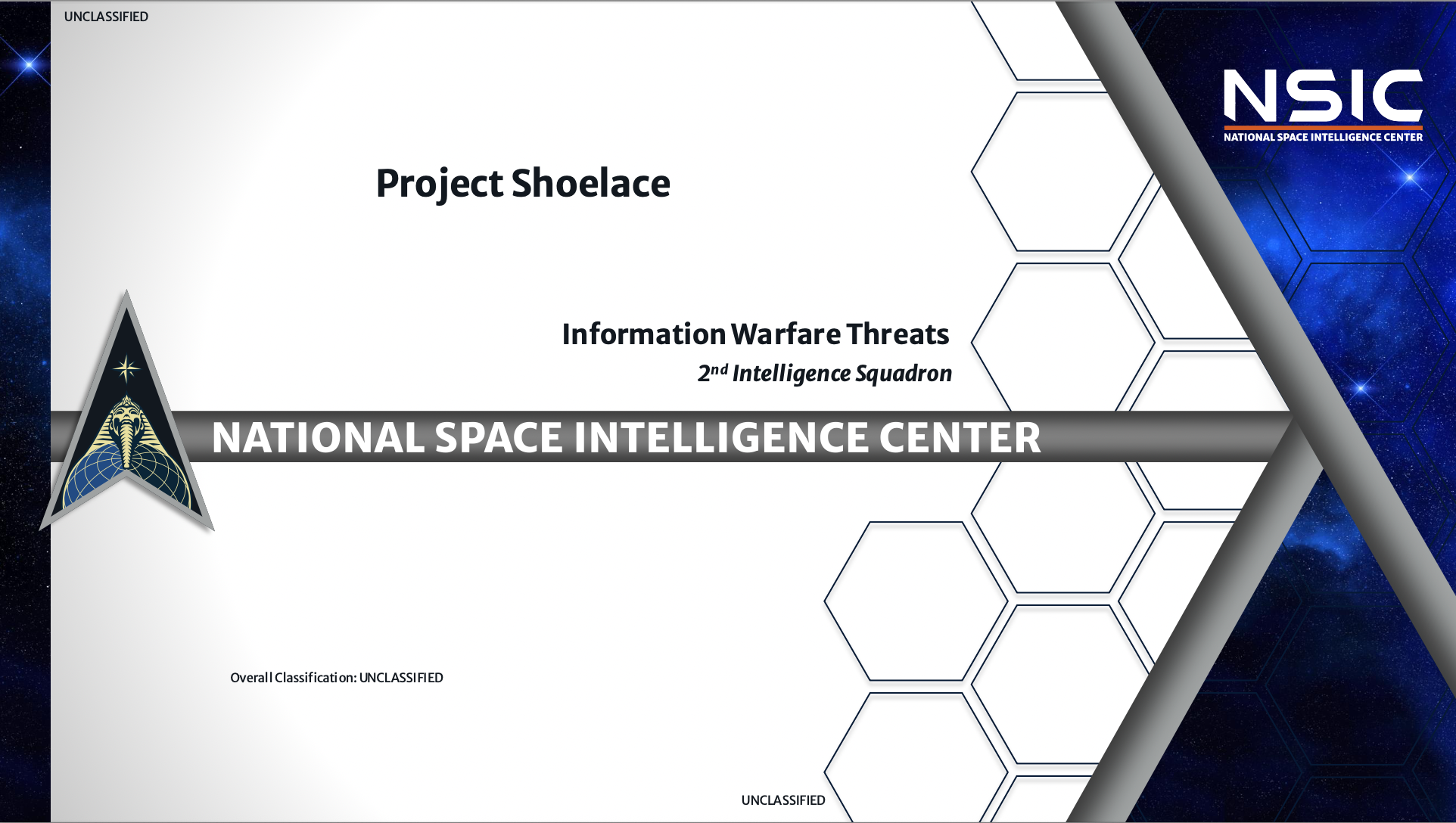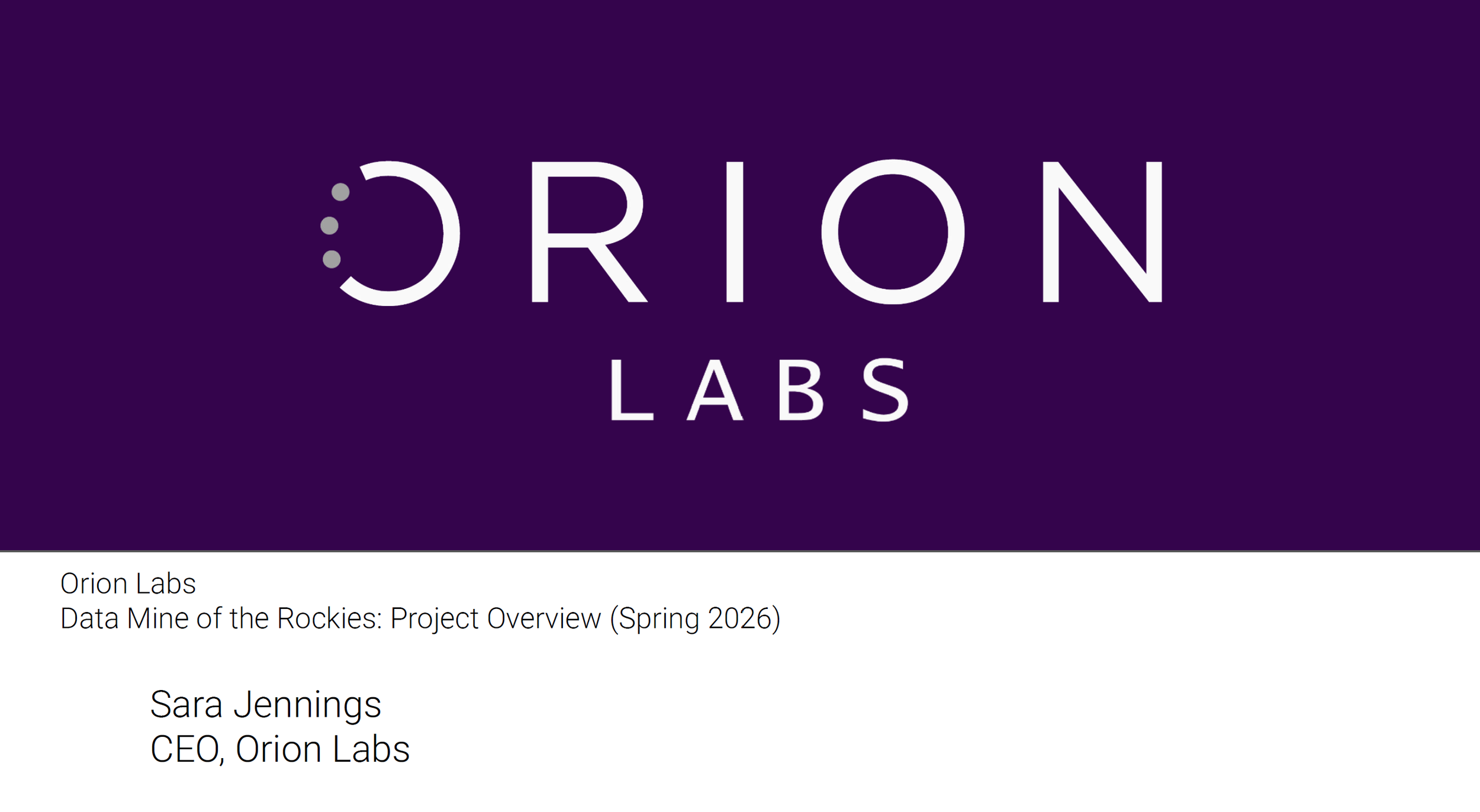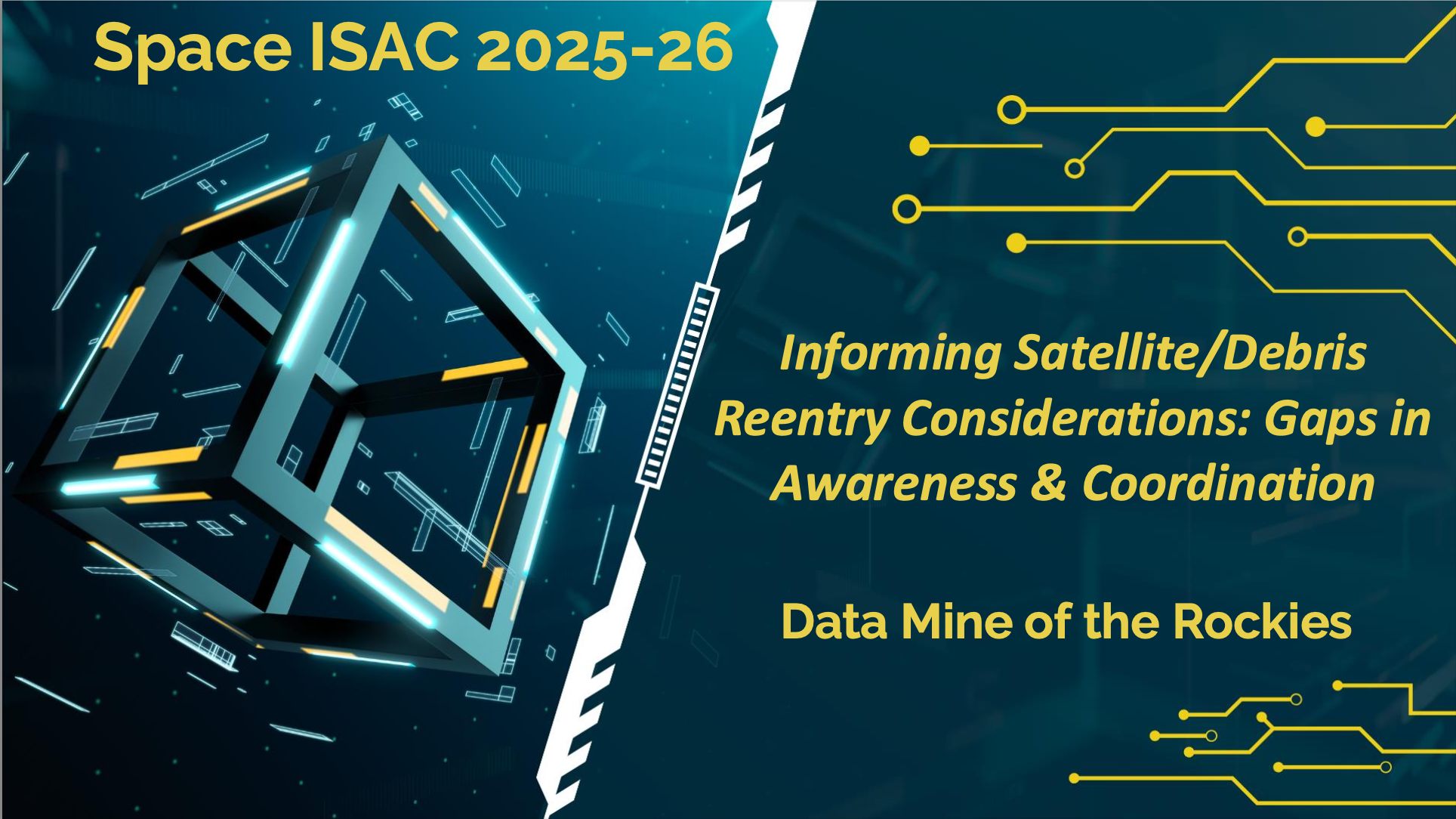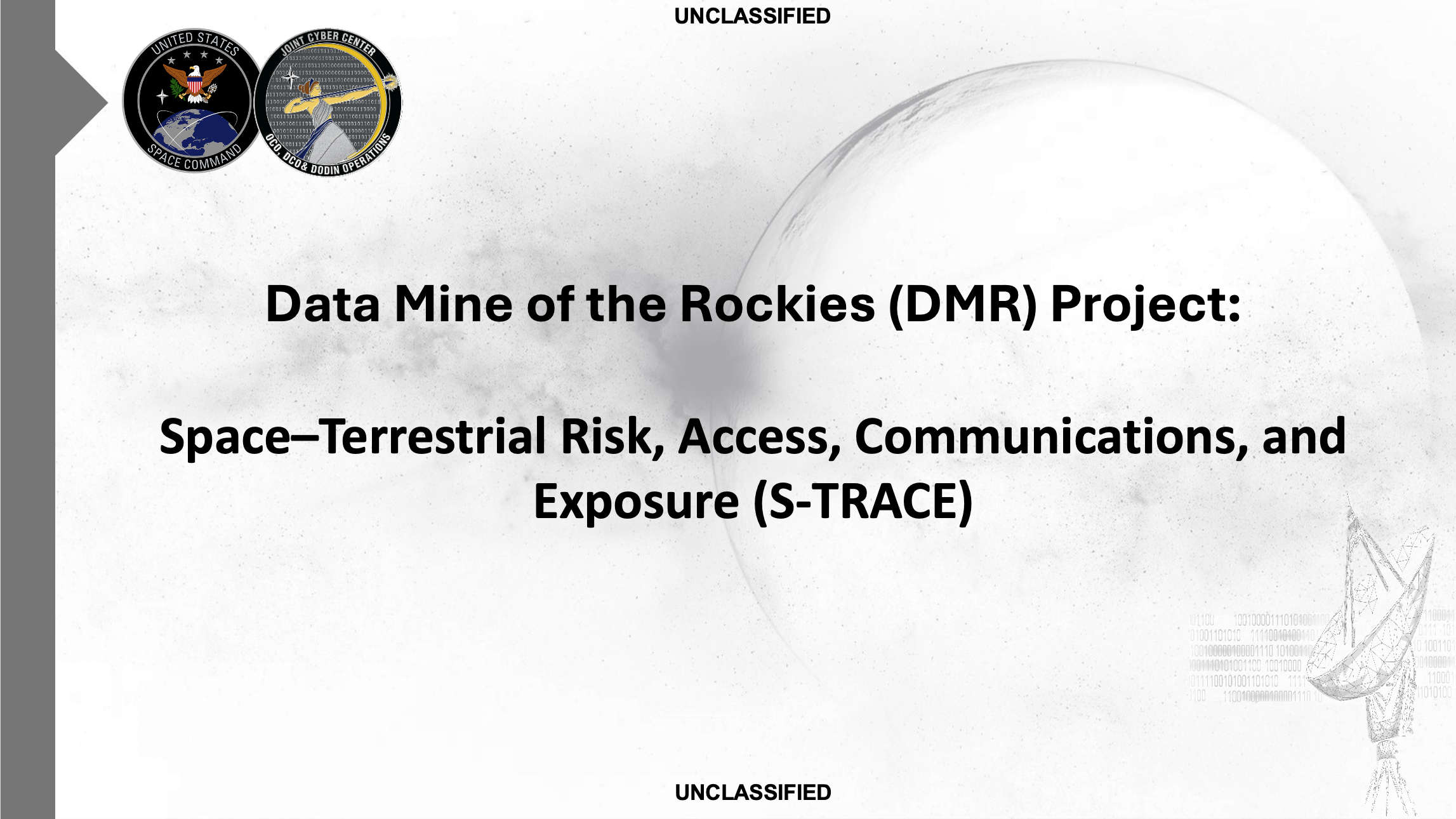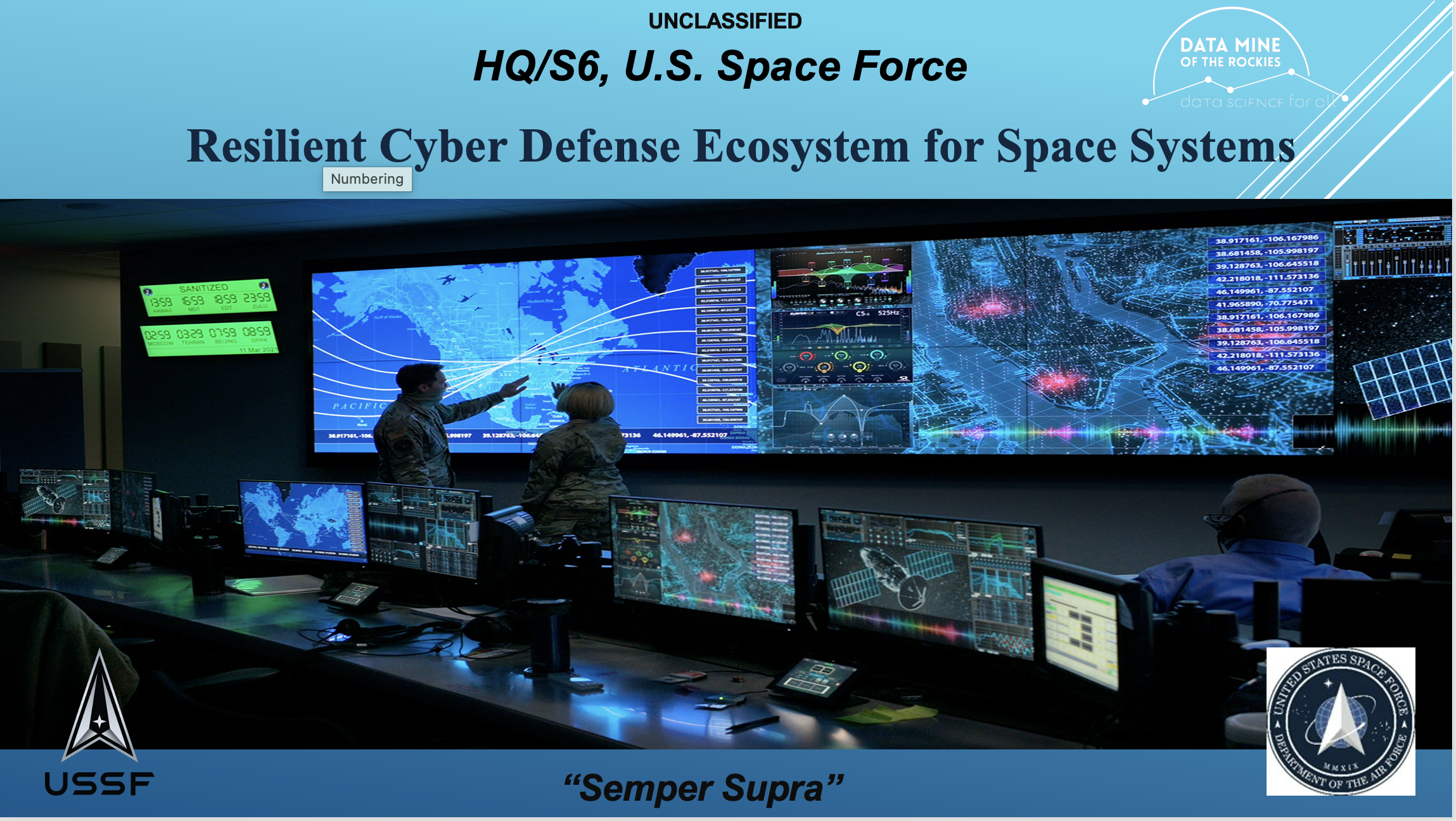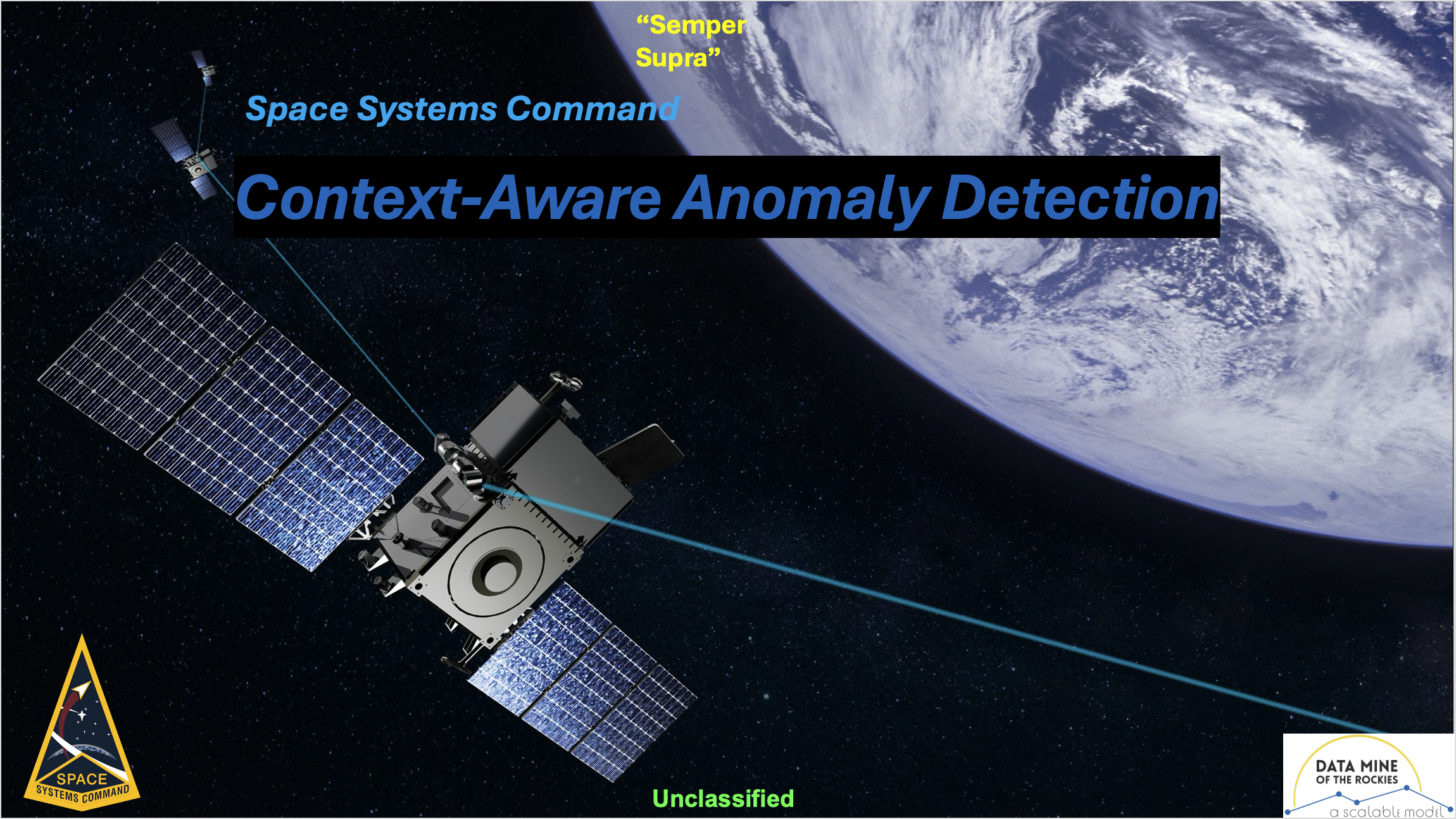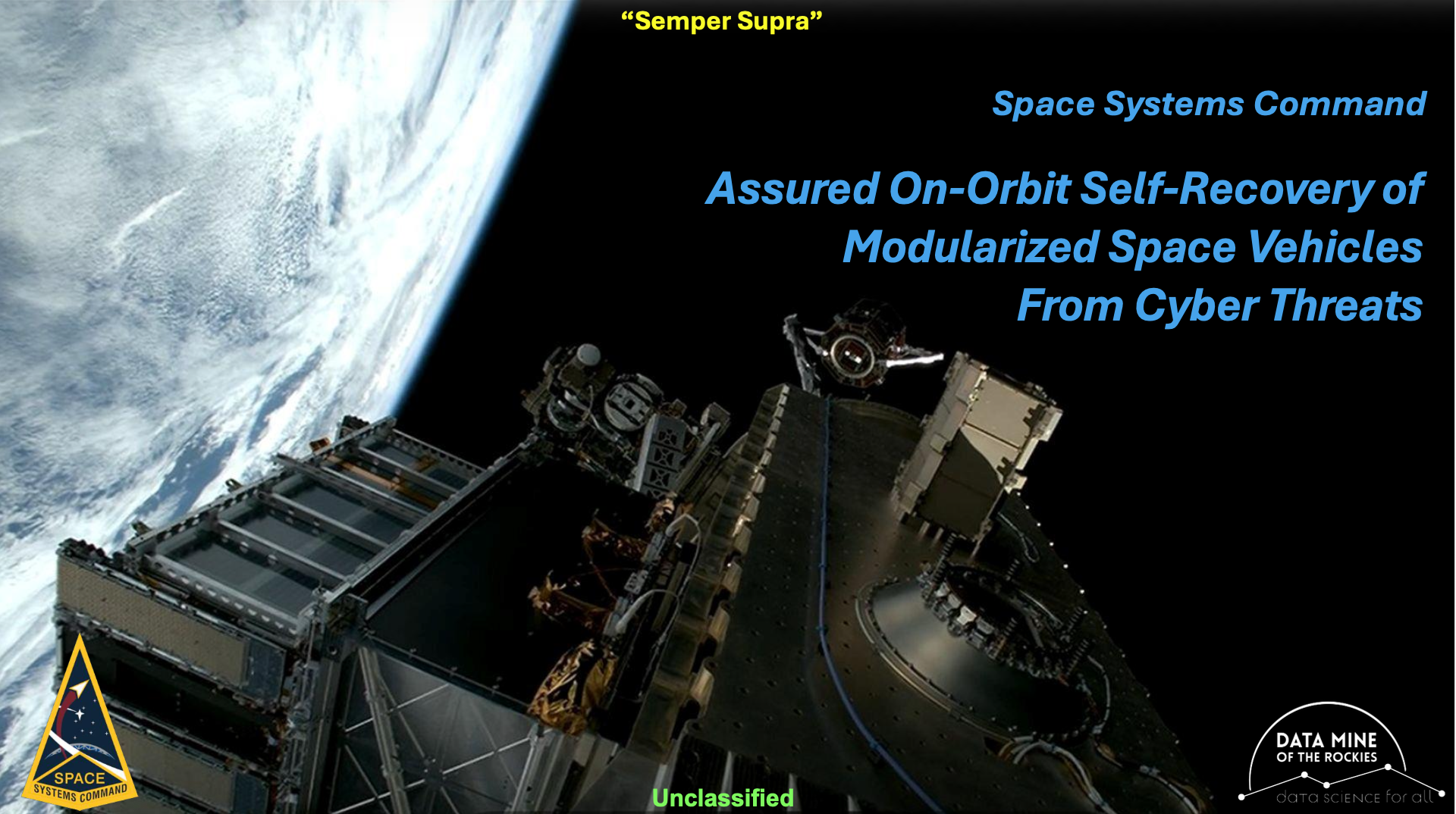CURRENT
PROJECTS
FALL 2025 - SPRING 2026
CURRENT
PROJECTS
FALL 2025 & SPRING 2026
MEET OUR
2025 - 2026
PROJECT PARTNERS
We are excited to offer these opportunities to our DMR students for Fall of 2025 and Spring of 2026. These projects will push the boundaries of applied data science, addressing topics like GPS anomaly detection, satellite reentry risk, infrastructure resilience, space domain awareness, and AI-based benchmarking.
MEET OUR
2025 - 2026
PROJECT PARTNERS
We are excited to offer these opportunities to our DMR students for Fall of 2025 and Spring of 2026. These projects will push the boundaries of applied data science, addressing topics like GPS anomaly detection, satellite reentry risk, infrastructure resilience, space domain awareness, and AI-based benchmarking.
Sixteenth Air Force (16AF): Real Time Data Fusion
Sixteenth Air Force (16AF): Real Time Data Fusion The Department of the Air Force boasts a wealth of expertise across multiple organizations, capable of designing, testing, and deploying cutting-edge sensor systems utilizing seismic, infrasound, material debris, and gaseous detection methods for on-site physical measurements and near-real-time analytic assessments. Building upon this strong foundation, a significant opportunity exists to enhance our capabilities further by developing an integrated analytical framework for real-time data fusion.
This innovative framework will harness the power of multi-sensor outputs, unlocking enhanced detection, identification, and characterization of terrestrial and atmospheric interference phenomena. By embracing this advancement, we will significantly improve timely situational awareness, strengthen reporting accuracy, and empower more informed operational decision-making, solidifying our strategic advantage.
Must be a U.S. citizen due to national security requirements.
Mentor Time
Tues., 11:30 A.M. - 12:20 P.M. (MT)
Lab Time
Thurs., 11:30 A.M. - 1:20 P.M. (MT)
Sixteenth Air Force (16AF): Real Time Data Fusion The Department of the Air Force boasts a wealth of expertise across multiple organizations, capable of designing, testing, and deploying cutting-edge sensor systems utilizing seismic, infrasound, material debris, and gaseous detection methods for on-site physical measurements and near-real-time analytic assessments. Building upon this strong foundation, a significant opportunity exists to enhance our capabilities further by developing an integrated analytical framework for real-time data fusion.
This innovative framework will harness the power of multi-sensor outputs, unlocking enhanced detection, identification, and characterization of terrestrial and atmospheric interference phenomena. By embracing this advancement, we will significantly improve timely situational awareness, strengthen reporting accuracy, and empower more informed operational decision-making, solidifying our strategic advantage.
Must be a U.S. citizen due to national security requirements.
Sixteenth Air Force (16AF): Real Time Data Fusion
Mentor Time
Tues., 11:30 A.M. - 12:20 P.M. (MT)
Lab Time
Thur., 11:30 A.M. - 1:20 P.M. (MT)
American Systems: Detecting Cyber-Suspicious Behavior in Space
American Systems: Detecting Cyber-Suspicious Behavior in Space Have you ever wondered how we track and identify threats in space? In this project, you’ll dive into the world of Space Domain Awareness (SDA) and help design tools to identify Resident Space Objects (RSOs) that might be behaving suspiciously—like changing orbits or acting outside their stated mission. These could signal cyber-related anomalies, and you’ll be part of developing the tech to spot them.
You’ll work on a prototype user interface (UI) and risk-scoring system to help analysts detect and flag unusual satellite behavior. Using skills like Python, AI/ML, SQL, and data visualization, your work will contribute to automated assessments that improve situational awareness in orbit. This project is a great fit for students interested in cybersecurity, modeling & simulation, space tech, and real-world defense applications.
Must be a U.S. citizen due to national security requirements.
Mentor Time
Tues., 9:30-10:20 A.M. (MT)
Lab Time
Thurs., 9:30-11:20 A.M. (MT)
American Systems: Detecting Cyber-Suspicious Behavior in Space
American Systems: Detecting Cyber-Suspicious Behavior in Space Have you ever wondered how we track and identify threats in space? In this project, you’ll dive into the world of Space Domain Awareness (SDA) and help design tools to identify Resident Space Objects (RSOs) that might be behaving suspiciously—like changing orbits or acting outside their stated mission. These could signal cyber-related anomalies, and you’ll be part of developing the tech to spot them.
You’ll work on a prototype user interface (UI) and risk-scoring system to help analysts detect and flag unusual satellite behavior. Using skills like Python, AI/ML, SQL, and data visualization, your work will contribute to automated assessments that improve situational awareness in orbit. This project is a great fit for students interested in cybersecurity, modeling & simulation, space tech, and real-world defense applications.
Must be a U.S. citizen due to national security requirements.
Mentor Time
Tues., 9:30-10:20 A.M. (MT)
Lab Time
Thurs., 9:30-11:20 A.M. (MT)
CrowdStrike: Applying Clustering and Similarity to Cybersecurity
CrowdStrike: Applying Clustering and Similarity to Cybersecurity Students on this project will collaborate with CrowdStrike, a global leader in cybersecurity, to explore how artificial intelligence and machine learning can be applied to detect, prevent, and respond to sophisticated cyber threats. This project will give students the opportunity to work with real-world cybersecurity frameworks and techniques, focusing on the development of models and processes that strengthen digital defense capabilities. By analyzing simulated attacks and threat scenarios, students will gain critical skills in anomaly detection, behavioral analytics, and predictive modeling. This project is ideal for students interested in AI, machine learning, and the evolving field of cybersecurity—providing hands-on experience at the cutting edge of digital protection.
Must be a U.S. citizen due to national security requirements.
Mentor Time
Fri., 1:30-2:20 P.M. (MT)
Lab Time
Mon., 1:30-3:20 P.M. (MT)
CrowdStrike: Applying Clustering and Similarity to Cybersecurity
CrowdStrike: Applying Clustering and Similarity to Cybersecurity Students on this project will collaborate with CrowdStrike, a global leader in cybersecurity, to explore how artificial intelligence and machine learning can be applied to detect, prevent, and respond to sophisticated cyber threats. This project will give students the opportunity to work with real-world cybersecurity frameworks and techniques, focusing on the development of models and processes that strengthen digital defense capabilities. By analyzing simulated attacks and threat scenarios, students will gain critical skills in anomaly detection, behavioral analytics, and predictive modeling. This project is ideal for students interested in AI, machine learning, and the evolving field of cybersecurity—providing hands-on experience at the cutting edge of digital protection.
Must be a U.S. citizen due to national security requirements.
Mentor Time
Fri., 1:30-2:20 P.M. (MT)
Lab Time
Mon., 1:30-3:20 P.M. (MT)
Cyberspatial: Deep Network Analysis and Simulation (DNASim)
Cyberspatial: Deep Network Analysis and Simulation (DNASim) Cybersecurity threats are constantly evolving, and protecting space-based assets requires innovative approaches. The Cyberpatial project challenges students to work on advanced methods of detecting and analyzing suspicious cyber behavior within satellite and space communication systems. Students will explore real-world cyber risk scenarios, experiment with data-driven techniques, and evaluate how AI/ML can strengthen resilience against emerging threats.
This project is ideal for students interested in the intersection of cybersecurity, data science, and space technologies. No advanced expertise is required—students will learn by doing alongside mentors, gaining practical experience in analyzing cyber data, developing detection models, and communicating insights. By the end, participants will not only strengthen their technical skills but also contribute to safeguarding critical infrastructure in the space domain.
Must be a U.S. citizen due to national security requirements.
Mentor Time
Fri., 9:30-10:20 A.M. (MT)
Lab Time
Mon., 9:30-11:20 A.M. (MT)
Cyberspatial: Deep Network Analysis and Simulation (DNASim)
Cyberspatial: Deep Network Analysis and Simulation (DNASim) Cybersecurity threats are constantly evolving, and protecting space-based assets requires innovative approaches. The Cyberpatial project challenges students to work on advanced methods of detecting and analyzing suspicious cyber behavior within satellite and space communication systems. Students will explore real-world cyber risk scenarios, experiment with data-driven techniques, and evaluate how AI/ML can strengthen resilience against emerging threats.
This project is ideal for students interested in the intersection of cybersecurity, data science, and space technologies. No advanced expertise is required—students will learn by doing alongside mentors, gaining practical experience in analyzing cyber data, developing detection models, and communicating insights. By the end, participants will not only strengthen their technical skills but also contribute to safeguarding critical infrastructure in the space domain.
Must be a U.S. citizen due to national security requirements.
Mentor Time
Fri., 9:30-10:20 A.M. (MT)
Lab Time
Mon., 9:30-11:20 A.M. (MT)
Defense Related Cybersecurity Project
Defense related cybersecurity project. Details are forthcoming regarding this project. However it will be similar in scope to our other cyber-related data projects from industry and Department of War (DoW).
Must be a U.S. person due to national security requirements.
L3Harris: Satellite Cyberattack Detection Using Telemetry Ever wondered how we protect satellites from cyber threats? In this project, you’ll join a team building a machine learning model that can detect cyberattacks using real satellite telemetry data. Using new datasets from the European Space Agency, you’ll simulate a “day-in-the-life” of a satellite and train AI models to detect and classify different types of cyber intrusions.
You’ll gain hands-on experience with tools like Python, Jupyter Notebooks, network packet analysis, threat modeling frameworks like SPARTA and MITRE ATT&CK, and more. Along the way, you’ll learn the fundamentals of cybersecurity in space systems, satellite operations, and data science.
This is an ideal project for students interested in space, cybersecurity, AI/ML, or defense innovation. No need to be an expert—just bring your curiosity and commitment to tackling real-world problems.
Must be a U.S. citizen due to national security requirements.
L3 Harris: Satellite Cyberattack Detection Using Telemetry
Mentor Time
Thurs., 1:30-2:20 P.M. (MT)
Lab Time
Tues. 1:30-3:20 P.M. (MT)
L3 Harris: Satellite Cyberattack Detection Using Telemetry
L3Harris: Satellite Cyberattack Detection Using Telemetry Ever wondered how we protect satellites from cyber threats? In this project, you’ll join a team building a machine learning model that can detect cyberattacks using real satellite telemetry data. Using new datasets from the European Space Agency, you’ll simulate a “day-in-the-life” of a satellite and train AI models to detect and classify different types of cyber intrusions.
You’ll gain hands-on experience with tools like Python, Jupyter Notebooks, network packet analysis, threat modeling frameworks like SPARTA and MITRE ATT&CK, and more. Along the way, you’ll learn the fundamentals of cybersecurity in space systems, satellite operations, and data science.
This is an ideal project for students interested in space, cybersecurity, AI/ML, or defense innovation. No need to be an expert—just bring your curiosity and commitment to tackling real-world problems.
Must be a U.S. citizen due to national security requirements.
Mentor Time
Thurs., 1:30-2:20 P.M. (MT)
Lab Time
Tues. 1:30-3:20 P.M. (MT)
NSIC: Project Shoelace: Detecting GPS Signal Disruptions
NSIC: Project Shoelace: Detecting GPS Signal Disruptions GPS signals are everywhere—from military operations to Uber rides—and disruptions can have serious, wide-ranging consequences. In this project, students will work alongside NSIC to improve machine learning algorithms that detect anomalies in the data supplied by the United States’ Global Positioning System (GPS), or more generally in readings from Global Navigation Satellite Systems (GNSS includes international peers of GPS). The student team will use large, complex, real-world, and publicly-accessible datasets. Students will refine and test models, explore global sensor networks, and help scale analytics that could eventually provide real-time warnings to GPS/GNSS users around the world. This is a chance to get hands-on with data science, AI, and national security while solving challenges that impact both defense and everyday life.
Must be a U.S. citizen due to national security requirements.
Mentor Time
Mon., 12:30-1:20 P.M. (MT)
Lab Time
Fri., 11:30-1:20 P.M. (MT)
NSIC: Project Shoelace: Detecting GPS Signal Disruptions
NSIC: Project Shoelace: Detecting GPS Signal Disruptions GPS signals are everywhere—from military operations to Uber rides—and disruptions can have serious, wide-ranging consequences. In this project, students will work alongside NSIC to improve machine learning algorithms that detect anomalies in the data supplied by the United States’ Global Positioning System (GPS), or more generally in readings from Global Navigation Satellite Systems (GNSS includes international peers of GPS). The student team will use large, complex, real-world, and publicly-accessible datasets. Students will refine and test models, explore global sensor networks, and help scale analytics that could eventually provide real-time warnings to GPS/GNSS users around the world. This is a chance to get hands-on with data science, AI, and national security while solving challenges that impact both defense and everyday life.
Must be a U.S. citizen due to national security requirements.
Mentor Time
Mon., 12:30-1:20 P.M. (MT)
Lab Time
Fri., 11:30-1:20 P.M. (MT)
Orion Labs: Near Miss Collision Analytics Data Project
Orion Labs: Near Miss Collision Analytics Data Project Transportation agencies rely on data to make informed decisions on mitigation strategies to prevent collisions. Typically crash data has been the data that has been relied upon to enact these strategies. Unfortunately, relying on crash data means accidents have already happened. Transportation agencies are now taking a proactive approach to prevent accidents in areas that are a high priority based on near miss data.
Near miss data is not as prevalent as crash data and is typically expensive to get. There is also questions within the industry if certain types of near misses (ex. hard braking incidents) correlate with eventual crashes. There is also not consensus as to what a “near-miss” is. Transportation agencies need a way to query traffic data and set their own parameters for near-miss collisions. They also need to be able to correlate information with historical crash data.
Open to all students.
Mentor Time
Mon., 11:30 A.M. -12:20 A.M. (MT)
Lab Time
Fri., 11:30 A.M. - 1:20 P.M. (MT)
Orion Labs: Near Miss Collision Analytics Data Project
Orion Labs: Near Miss Collision Analytics Data Project Transportation agencies rely on data to make informed decisions on mitigation strategies to prevent collisions. Typically crash data has been the data that has been relied upon to enact these strategies. Unfortunately, relying on crash data means accidents have already happened. Transportation agencies are now taking a proactive approach to prevent accidents in areas that are a high priority based on near miss data.
Near miss data is not as prevalent as crash data and is typically expensive to get. There is also questions within the industry if certain types of near misses (ex. hard braking incidents) correlate with eventual crashes. There is also not consensus as to what a “near-miss” is. Transportation agencies need a way to query traffic data and set their own parameters for near-miss collisions. They also need to be able to correlate information with historical crash data.
Open to all students.
Mentor Time
Mon., 11:30 A.M. -12:20 A.M. (MT)
Lab Time
Fri., 11:30 A.M. - 1:20 P.M. (MT)
SDA TAP Lab: Labeling & Storing Space Domain Data
SDA TAP Lab: Labeling & Storing Space Domain Data Are you curious about how the U.S. Space Force identifies and tracks unknown objects in orbit? Join the SDA TAP Lab project to help build the data infrastructure that powers space situational awareness. This project focuses on creating a standardized, web-based system to label and store data on uncorrelated tracks (UCTs)—objects in space that don’t match known satellites. You’ll help develop the tools that feed into a Common Task Framework, enabling future machine learning algorithms to detect, classify, and respond to space threats in real time. If you’re interested in working with real-world orbital data, developing structured datasets, and supporting national security missions, this is your chance to make a real impact.
Must be a U.S. citizen due to national security requirements.
Mentor Time
Thur, 1:30 - 2:20 P.M. (MT)
Lab Time
Tue, 1:30 - 3:20 P.M. (MT)
SDA TAP Lab: Labeling & Storing Space Domain Data Are you curious about how the U.S. Space Force identifies and tracks unknown objects in orbit? Join the SDA TAP Lab project to help build the data infrastructure that powers space situational awareness. This project focuses on creating a standardized, web-based system to label and store data on uncorrelated tracks (UCTs)—objects in space that don’t match known satellites. You’ll help develop the tools that feed into a Common Task Framework, enabling future machine learning algorithms to detect, classify, and respond to space threats in real time. If you’re interested in working with real-world orbital data, developing structured datasets, and supporting national security missions, this is your chance to make a real impact.
Must be a U.S. citizen due to national security requirements.
SDA TAP Lab: Labeling & Storing Space Domain Data
Mentor Time
Thur, 1:30 - 2:20 P.M. (MT)
Lab Time
Tue, 1:30 - 3:20 P.M. (MT)
Space ISAC: Informing Satellite & Debris Reentry Considerations: Gaps in Awareness & Coordination
Space ISAC: Informing Satellite & Debris Reentry Co Have you ever wondered what happens when satellites or space debris reenter Earth’s atmosphere? This project offers students a unique opportunity to explore that very question with one of the leading organizations in space cybersecurity and situational awareness—Space ISAC. As a DMR student, you’ll contribute to research focused on improving how the space community anticipates and coordinates around satellite and debris reentry events.
You’ll examine current gaps in awareness, communication, and coordination across space agencies and private entities, and propose data-driven solutions that could enhance global collaboration and response efforts. The insights developed through this project could influence future strategies for safer and more informed space operations.
This is a great project for students interested in space policy, cybersecurity, systems thinking, and data analysis with real-world impact.
Must be a U.S. citizen due to national security requirements.
Mentor Time
Thur, 2:30 - 3:20 P.M. (MT)
Lab Time
Tue, 1:30 - 3:20 P.M. (MT)
Space ISAC: Informing Satellite & Debris Reentry Considerations: Gaps in Awareness & Coordination
Space ISAC: Informing Satellite & Debris Reentry Co Have you ever wondered what happens when satellites or space debris reenter Earth’s atmosphere? This project offers students a unique opportunity to explore that very question with one of the leading organizations in space cybersecurity and situational awareness—Space ISAC. As a DMR student, you’ll contribute to research focused on improving how the space community anticipates and coordinates around satellite and debris reentry events.
You’ll examine current gaps in awareness, communication, and coordination across space agencies and private entities, and propose data-driven solutions that could enhance global collaboration and response efforts. The insights developed through this project could influence future strategies for safer and more informed space operations.
This is a great project for students interested in space policy, cybersecurity, systems thinking, and data analysis with real-world impact.
Must be a U.S. citizen due to national security requirements.
Mentor Time
Thur, 2:30 - 3:20 P.M. (MT)
Lab Time
Tue, 1:30 - 3:20 P.M. (MT)
SpOC: Building Better AI with Space Data – SpOC UCT Benchmarking
SpOC: Building Better AI with Space Data – SpOC UCT Benchmarking In this project, you’ll work directly with Space Operations Command (SpOC) and the SDA TAP Lab to help shape the future of space data science. Your team will design tools to build benchmark datasets—essential for training and testing machine learning models used in Space Domain Awareness (SDA). These tools will support the processing of Uncorrelated Tracks (UCTs), which are unknown or untracked objects in space.
Using open-source data and working with subject matter experts, you’ll automate the labeling, cleaning, and organizing of real space data (like satellite maneuvers and launch events). Then, you’ll help define how algorithm performance should be measured—so results can be fairly compared across developers using a Common Task Framework.
This is an exciting opportunity for students interested in artificial intelligence, space operations, or software development to be part of building the next generation of tools for national security and space traffic management.
Must be a U.S. citizen due to national security requirements.
Mentor Time
Thur, 1:30 - 2:20 P.M. (MT)
Lab Time
Tue, 1:30 - 3:20 P.M. (MT)
SpOC: Building Better AI with Space Data – SpOC UCT Benchmarking In this project, you’ll work directly with Space Operations Command (SpOC) and the SDA TAP Lab to help shape the future of space data science. Your team will design tools to build benchmark datasets—essential for training and testing machine learning models used in Space Domain Awareness (SDA). These tools will support the processing of Uncorrelated Tracks (UCTs), which are unknown or untracked objects in space.
Using open-source data and working with subject matter experts, you’ll automate the labeling, cleaning, and organizing of real space data (like satellite maneuvers and launch events). Then, you’ll help define how algorithm performance should be measured—so results can be fairly compared across developers using a Common Task Framework.
This is an exciting opportunity for students interested in artificial intelligence, space operations, or software development to be part of building the next generation of tools for national security and space traffic management.
Must be a U.S. citizen due to national security requirements.
SpOC: Building Better AI with Space Data – SpOC UCT Benchmarking
Mentor Time
Thur, 1:30 - 2:20 P.M. (MT)
Lab Time
Tue, 1:30 - 3:20 P.M. (MT)
SPACECOM: Predicting Infrastructure Degradation and Failure
United States Space Command J4 (SPACECOM J4): Predicting Infrastructure Degradation and Failure.
Must be a U.S. citizen due to national security requirements.
Mentor Time
Tues. 10:30-11:20 A.M. (MT)
Lab Time
Thurs. 9:30-11:20 A.M. (MT)
USSPACECOM Joint Cyber Center (JCC): S-TRACE
USSPACECOM Joint Cyber Center (JCC): S-TRACE Modern space operations depend on complex connections between satellites, ground stations, and terrestrial networks and disruptions anywhere along that path can threaten mission success. In this project, students will work with U.S. Space Command’s Joint Cyber Center to help develop S-TRACE, a cyber situational awareness tool that integrates orbital visibility, space-to-ground communications modeling, and cyber threat intelligence. Students will analyze real-world data sources, map space–terrestrial communication paths, and correlate cyber vulnerabilities with mission-critical assets. The team will help scale analytics that improve resilience planning, reduce unexpected contact loss, and accelerate incident response. This is a hands-on opportunity to apply data science, cybersecurity, and space systems analysis to challenges central to national security and space mission assurance.
Mentor Time
Thurs., 1:30-2:20 P.M. (MT)
Lab Time
Tues. 1:30-3:20 P.M. (MT)
SPACECOM: Predicting Infrastructure Degradation and Failure
United States Space Command J4 (SPACECOM J4): Predicting Infrastructure Degradation and Failure.
Must be a U.S. citizen due to national security requirements.
Mentor Time
Tues. 10:30-11:20 A.M. (MT)
Lab Time
Thurs. 9:30-11:20 A.M. (MT)
USSPACECOM Joint Cyber Center (JCC): S-TRACE Modern space operations depend on complex connections between satellites, ground stations, and terrestrial networks and disruptions anywhere along that path can threaten mission success. In this project, students will work with U.S. Space Command’s Joint Cyber Center to help develop S-TRACE, a cyber situational awareness tool that integrates orbital visibility, space-to-ground communications modeling, and cyber threat intelligence. Students will analyze real-world data sources, map space–terrestrial communication paths, and correlate cyber vulnerabilities with mission-critical assets. The team will help scale analytics that improve resilience planning, reduce unexpected contact loss, and accelerate incident response. This is a hands-on opportunity to apply data science, cybersecurity, and space systems analysis to challenges central to national security and space mission assurance.
USSPACECOM Joint Cyber Center (JCC):
S-TRACE
Mentor Time
Thurs., 1:30-2:20 P.M. (MT)
Lab Time
Tues. 1:30-3:20 P.M. (MT)
USSF HQ/S6: Resilient Cyber Defense Ecosystem for Space Systems
USSF HQ/S6: Resilient Cyber Defense Ecosystem for Space Systems This effort will involve the design process and implementation of an integrated defensive ecosystem composed of three mutually reinforcing components that collectively support secure, resilient spacecraft operations:
1. Quantum-Resistant & Radiation-Aware Communication Layer
Implements PQC algorithms using open-source standards (ML-KEM for key exchange, ML-DSA for authentication, and AES for symmetric encryption).
Incorporates radiation-resilience features such as key-material integrity checks, periodic cryptographic self-tests, autonomous fallback/re-keying, and transient-fault recovery logic.
Employs a software-based radiation fault-injection framework—simulating single-event upsets, burst errors, and cumulative degradation—to evaluate and reinforce cryptographic robustness under space-relevant conditions.
Provides a firmware/software-centric design suitable for supporting legacy and future satellite communication architectures.
2. Autonomous Intrusion Detection & Prevention System (IDPS)
Deploys behavior-driven and signature-based detection using tools such as Suricata and Snort within a virtualized spacecraft environment.
Coordinates with the PQC layer to unify secure communication and cyber monitoring.
Distinguishes between malicious anomalies and radiation-induced effects using integrated telemetry and fault-injection event data.
3. Machine-Learning Data Analytics Engine
Performs real-time fusion and anomaly characterization on telemetry, network flows, and system-behavior data.
Utilizes public datasets (e.g., CICIDS2017, UNSW-NB15, UNR-IDD) alongside custom spacecraft-style logs generated from IDPS and radiation-fault events.
Enhances situational understanding by identifying early indicators of cyber intrusions, degraded crypto state, or radiation-driven disruption.
Must be a U.S. citizen due to national security requirements.
Mentor Time
Mon., 1:30 P.M. - 2:20 P.M. (MT)
Lab Time
Fri., 1:30 P.M. - 3:20 P.M. (MT)
USSF HQ/S6: Resilient Cyber Defense Ecosystem for Space Systems
USSF HQ/S6: Resilient Cyber Defense Ecosystem for Space Systems This effort will involve the design process and implementation of an integrated defensive ecosystem composed of three mutually reinforcing components that collectively support secure, resilient spacecraft operations:
1. Quantum-Resistant & Radiation-Aware Communication Layer
Implements PQC algorithms using open-source standards (ML-KEM for key exchange, ML-DSA for authentication, and AES for symmetric encryption).
Incorporates radiation-resilience features such as key-material integrity checks, periodic cryptographic self-tests, autonomous fallback/re-keying, and transient-fault recovery logic.
Employs a software-based radiation fault-injection framework—simulating single-event upsets, burst errors, and cumulative degradation—to evaluate and reinforce cryptographic robustness under space-relevant conditions.
Provides a firmware/software-centric design suitable for supporting legacy and future satellite communication architectures.
2. Autonomous Intrusion Detection & Prevention System (IDPS)
Deploys behavior-driven and signature-based detection using tools such as Suricata and Snort within a virtualized spacecraft environment.
Coordinates with the PQC layer to unify secure communication and cyber monitoring.
Distinguishes between malicious anomalies and radiation-induced effects using integrated telemetry and fault-injection event data.
3. Machine-Learning Data Analytics Engine
Performs real-time fusion and anomaly characterization on telemetry, network flows, and system-behavior data.
Utilizes public datasets (e.g., CICIDS2017, UNSW-NB15, UNR-IDD) alongside custom spacecraft-style logs generated from IDPS and radiation-fault events.
Enhances situational understanding by identifying early indicators of cyber intrusions, degraded crypto state, or radiation-driven disruption.
Must be a U.S. citizen due to national security requirements.
Mentor Time
Mon., 1:30 P.M. - 2:20 P.M. (MT)
Lab Time
Fri., 1:30 P.M. - 3:20 P.M. (MT)
USSF SPACE SYSTEMS COMMAND (SSC): Context-Aware Anomaly Detection
USSF SSC: Context-Aware Anomaly Detection Machine learning models have been widely adopted across many domains to support classification, prediction, and pattern-recognition tasks at scale. Within this landscape, data-fusion models play an increasingly important role by integrating information from multiple data sources to capture richer system dynamics than any single modality can provide.
These approaches—ranging from statistical fusion frameworks to modern graph-based and multi-modal deep learning architectures—enable more comprehensive situational understanding and improved model robustness. Building on these advances, this project aims to learn baseline patterns of activity across multiple types of data sources, such as logs, sensors, behavioral signals, and telemetry, and to explore graph-based fusion methods, multi-modal deep learning, and transfer-learning techniques to improve pattern recognition and reduce false alarms in complex systems.
Mentor Time
Mon., 11:30 A.M. - 12:20 P.M. (MT)
Lab Time
Fri., 11:30 A.M. - 1:20 P.M. (MT)
USSF SPACE SYSTEMS COMMAND (SSC): Context-Aware Anomaly Detection
USSF SSC: Context-Aware Anomaly Detection Machine learning models have been widely adopted across many domains to support classification, prediction, and pattern-recognition tasks at scale. Within this landscape, data-fusion models play an increasingly important role by integrating information from multiple data sources to capture richer system dynamics than any single modality can provide.
These approaches—ranging from statistical fusion frameworks to modern graph-based and multi-modal deep learning architectures—enable more comprehensive situational understanding and improved model robustness. Building on these advances, this project aims to learn baseline patterns of activity across multiple types of data sources, such as logs, sensors, behavioral signals, and telemetry, and to explore graph-based fusion methods, multi-modal deep learning, and transfer-learning techniques to improve pattern recognition and reduce false alarms in complex systems.
Mentor Time
Mon., 11:30 A.M. - 12:20 P.M. (MT)
Lab Time
Fri., 11:30 A.M. - 1:20 P.M. (MT)
U.S. Space Force SSC/BZZY: Assured On-Orbit Self-Recovery of Modularized Space Vehicles From Cyber Threats
USSF U.S. Space Force SSC/BZZY: Assured On-Orbit Self-Recovery of Modularized Space Vehicles From Cyber Threats: Modern space systems increasingly employ modular, software-defined architectures to support adaptability and long-term operation in complex environments in Space. Some modular systems lack assured recovery mechanisms that can fully restore compromised components to a verified, trusted state that is safe for operations in space. Further research is needed to develop trusted initialization and recovery mechanisms, root-of-trust architecture, and secure reintegration processes for modular systems.
This effort will involve research and experimentation across three complementary focus areas that collectively advance modularized cyber-resilient architectures for on-orbit space vehicles:
1. Modular Cyber Architecture and Compartmentalization
Investigates modular spacecraft cyber architectures that isolate software and hardware components to limit the spread and impact of cyber compromise.
Examines compartmentalization techniques, such as process isolation, virtual machines, and microkernel-based separation, suitable for on-orbit, resource-constrained environments.
2. Reinitialization and Ground-State Recovery
Explores cybersecurity mechanisms that enable compromised modules to be autonomously contained and reinitialized to a verified, malware-free state.
Emphasizes automation, as the final product will be evaluated in a simulated on-orbit environment without ground intervention.
3. Cyber Fault Injection and Modular Resilience Validation
Designs cyber fault-injection techniques to simulate malware persistence, configuration corruption, and compromised execution states within modular spacecraft systems.
Conducts research on AI-driven testbeds to emulate adversarial behaviors, trigger cyber events, and evaluate containment and recovery mechanisms.
Must be a U.S. citizen due to national security requirements.
Mentor Time
Mon., 10:30 A.M. – 11:20 A.M. (MT)
Lab Time
Fri., 9:30 A.M. – 11:20 A.M. (MT)
U.S. Space Force SSC/BZZY: Assured On-Orbit Self-Recovery of Modularized Space Vehicles From Cyber Threats
USSF U.S. Space Force SSC/BZZY: Assured On-Orbit Self-Recovery of Modularized Space Vehicles From Cyber Threats: Modern space systems increasingly employ modular, software-defined architectures to support adaptability and long-term operation in complex environments in Space. Some modular systems lack assured recovery mechanisms that can fully restore compromised components to a verified, trusted state that is safe for operations in space. Further research is needed to develop trusted initialization and recovery mechanisms, root-of-trust architecture, and secure reintegration processes for modular systems.
This effort will involve research and experimentation across three complementary focus areas that collectively advance modularized cyber-resilient architectures for on-orbit space vehicles:
1. Modular Cyber Architecture and Compartmentalization
Investigates modular spacecraft cyber architectures that isolate software and hardware components to limit the spread and impact of cyber compromise.
Examines compartmentalization techniques, such as process isolation, virtual machines, and microkernel-based separation, suitable for on-orbit, resource-constrained environments.
2. Reinitialization and Ground-State Recovery
Explores cybersecurity mechanisms that enable compromised modules to be autonomously contained and reinitialized to a verified, malware-free state.
Emphasizes automation, as the final product will be evaluated in a simulated on-orbit environment without ground intervention.
3. Cyber Fault Injection and Modular Resilience Validation
Designs cyber fault-injection techniques to simulate malware persistence, configuration corruption, and compromised execution states within modular spacecraft systems.
Conducts research on AI-driven testbeds to emulate adversarial behaviors, trigger cyber events, and evaluate containment and recovery mechanisms.
Must be a U.S. citizen due to national security requirements.
Mentor Time
Mon., 10:30 A.M. – 11:20 A.M. (MT)
Lab Time
Fri., 9:30 A.M. – 11:20 A.M. (MT)





